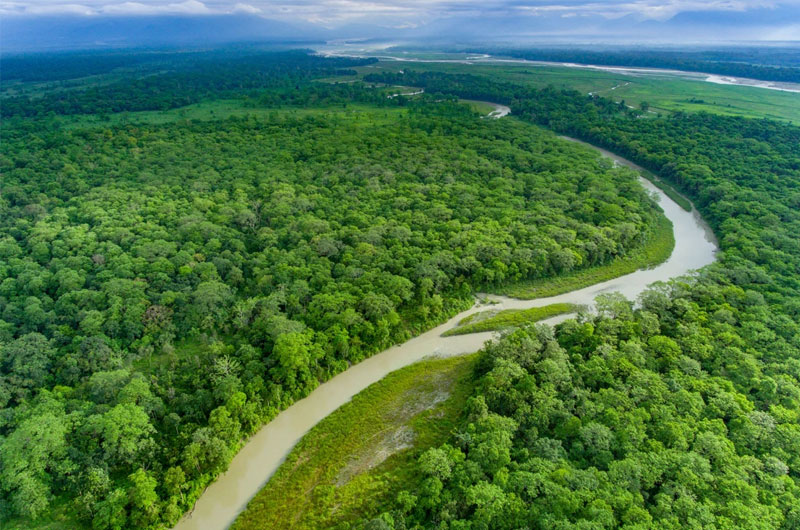
Jaldapara National Park: Jewel of North Bengal’s Wildlife Sanctuary
Jaldapara National Park, located in the Alipurduar district of West Bengal, India, is a prominent wildlife sanctuary known for its diverse flora and fauna. Established in 1941, the park is renowned for its population of the rare Indian one-horned rhinoceros and is part of the Terai-Duar savanna and grasslands eco-region. This guide provides a comprehensive overview of Jaldapara National Park, highlighting its specialties, locality, best time to visit, and nearby amenities.
Overview of Jaldapara National Park
Location and Geography
- Locality: Alipurduar district, West Bengal, India
- Geographical Features:
- Situated in the foothills of the Eastern Himalayas, near the Bhutan border
- Spreads across vast grasslands, riverine forests, and swampy areas
- Accessible from Siliguri and Jalpaiguri towns, approximately 130 kilometers from Siliguri
Specialty
- Wildlife Diversity:
- Home to the Indian one-horned rhinoceros, an endangered species
- Other wildlife includes Asian elephants, Bengal tigers, leopards, and various deer species
- Significant bird population with over 200 avian species, making it a birdwatcher’s paradise
Best Time to Visit
- Optimal Seasons: October to March
- Weather Conditions:
- Winter (October to February): Pleasant weather, ideal for wildlife sightings and safaris
- Summer (March to May): Hot days, better visibility of animals near water sources
- Monsoon (June to September): Park may have restricted access due to heavy rainfall and breeding season
Wildlife and Flora
Fauna
- Mammals:
- Indian one-horned rhinoceros, Indian elephants, Bengal tigers, leopards, and bison
- Various species of deer including sambar, barking deer, and hog deer
Avifauna
- Birds:
- Rich birdlife including hornbills, eagles, peafowl, and migratory birds during winter months
- Birdwatching opportunities along the park’s diverse habitats
Flora
- Vegetation Types:
- Riverine forests with tall grasslands, savannas, and patches of tropical moist deciduous forests
- Dominated by tall grasses, sal trees, and bamboo thickets
Zones and Activities
Main Zones
- Chilapata Forest Area:
- Scenic landscapes and wildlife corridors connecting Jaldapara with nearby forests
- Jeep safaris and guided walks for wildlife enthusiasts
Activities
- Safaris:
- Elephant safaris and jeep safaris offered for wildlife viewing
- Early morning and late afternoon safaris provide optimal chances for spotting wildlife
- Nature Walks:
- Guided walks with naturalists to explore the park’s flora, fauna, and birdwatching spots
- Educational tours on wildlife conservation and local biodiversity
Nearby Restaurants and Hotels
Restaurants
- Chilapata Forest Rest House Restaurant:
- Offers local Bengali cuisine and North Indian dishes
- Located near the park entrance, providing views of the surrounding forests
Hotels and Lodges
- Jaldapara Tourist Lodge:
- Government-run lodge offering basic accommodations and wildlife safari packages
- Close proximity to Jaldapara National Park, ideal for wildlife enthusiasts
- Hollong Tourist Lodge:
- Eco-friendly lodge amidst lush greenery, offering comfortable stays and safari arrangements
- Organizes nature walks, birdwatching tours, and cultural experiences
- The Reserve Greens Resort:
- Luxury resort with modern amenities and scenic views of the park’s surroundings
- Provides guided tours to Jaldapara National Park and nearby attractions
Conclusion
Jaldapara National Park is a treasure trove of wildlife and natural beauty in North Bengal, offering a unique experience for wildlife enthusiasts and nature lovers. Whether you are interested in seeing the majestic rhinoceros, exploring diverse habitats, or enjoying birdwatching, Jaldapara promises an enriching journey into the wilderness. Plan your visit during the recommended seasons to maximize wildlife sightings and explore the park’s ecological diversity. Engage in safaris, nature walks, and birdwatching to discover why Jaldapara National Park is a cherished destination for wildlife conservation and ecotourism in West Bengal.
